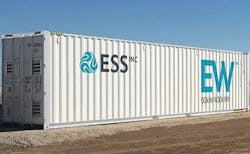Iron-flow Battery firm ESS will supply BESS to ground operations at Amsterdam Airport
A Dutch airport will utilize a long-duration battery storage solution from a U.S. manufacturer as part of its aim to decarbonize on-site operations.
ESS Inc., a U.S.-based energy storage systems manufacturer, will deliver its iron flow battery solution to Amsterdam Airport Schiphol in the Netherlands in this year’s first quarter.
According to the company, its Energy Warehouse system will be used as part of a pilot aimed at retiring polluting diesel generators in the future and assisting in Schiphol’s sustainability plan to be a zero-waste and emission-free airport by 2030.
The system will be used to recharge Electric Ground Power Units (E-GPUs), which are batteries that will replace diesel units used to supply power to parked aircraft. ESS says its iron flow batteries are safe for use in close proximity to passenger aircraft as they are nontoxic and pose no fire or explosion risk.
“The decarbonization of air travel is crucial and Schiphol is leading the way,” said Alan Greenshields, ESS Director for Europe. “We are proud to partner with a leading airport operator to demonstrate and pilot the key role that long-duration energy storage will play in helping to decarbonize airport operations and reduce ground-level emissions, improving air quality for airport and airline employees and passengers.”
Energy Management and the Workplace of the Future: Insights from InfoGrid
ESS adds that its iron flow technology provides a cost-effective solution for long-duration energy storage. It is suitable for various applications that need up to 12 hours of flexible energy capacity, such as utility-scale renewable energy installations, solar load-shifting and peak shaving, remote solar and storage microgrids, and other ancillary grid services.
“We hope that the partnership with ESS enables Schiphol to advance our electrification and decarbonization strategy,” said Oscar Maan, Royal Schiphol Group Manager of Innovation. “If this pilot is successful, this is a double win as it both reduces our carbon footprint and reduces air pollution."
The pilot will also be part of TULIPS, an EU-funded consortium that aims to speed up the rollout of sustainable technologies in aviation and achieve zero emissions and zero waste at EU airports by 2030 and climate-neutral aviation by 2050.
Amsterdam Airport Schiphol is the second largest airport in mainland Europe.
ESS is making inroads to providing utility-scale, long-duration energy storage for utilities in the U.S., as well. Last year, the company announced projects with Consumers Energy, Burbank Water and Power, and San Diego Gas & Electric in 2021.
About the Author
EnergyTech Staff
Rod Walton is head of content for EnergyTech.com. He has spent 17 years covering the energy industry as a newspaper and trade journalist.
Walton formerly was energy writer and business editor at the Tulsa World. Later, he spent six years covering the electricity power sector for Pennwell and Clarion Events. He joined Endeavor and EnergyTech in November 2021.
He can be reached at [email protected].
EnergyTech is focused on the mission critical and large-scale energy users and their sustainability and resiliency goals. These include the commercial and industrial sectors, as well as the military, universities, data centers and microgrids.
Many large-scale energy users such as Fortune 500 companies, and mission-critical users such as military bases, universities, healthcare facilities, public safety and data centers, shifting their energy priorities to reach net-zero carbon goals within the coming decades. These include plans for renewable energy power purchase agreements, but also on-site resiliency projects such as microgrids, combined heat and power, rooftop solar, energy storage, digitalization and building efficiency upgrades.
